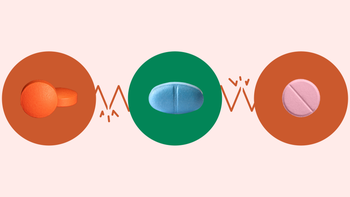
The 6 Best OTC Pain Relievers: Comparing Advil, Tylenol, and More
Key takeaways:
Ibuprofen (Advil, Motrin), naproxen (Aleve), and aspirin are three common over-the-counter (OTC) pain relievers. Other OTC pain relief medications include acetaminophen (Tylenol), Alka-Seltzer (aspirin / citric acid / sodium bicarbonate), and diclofenac 1% gel (Voltaren Arthritis Pain).
The best pain reliever for you depends on what type of pain you’re treating. For example, nonsteroidal anti-inflammatory drugs (NSAIDs) like ibuprofen and naproxen may be best for swelling and inflammation. But acetaminophen tends to have fewer risks, so it may be a better choice for pain if you have existing kidney or heart problems.
Like all medications, these OTC pain medications can have side effects. Always check with your healthcare team before starting a new medication.
Table of contents
Have a headache, a pulled muscle, or body aches? Over-the-counter (OTC) pain relievers like ibuprofen (Advil, Motrin), aspirin, or acetaminophen (Tylenol) may be able to help. Unlike prescription pain medications called opioids, OTC pain relief medications aren’t habit-forming. And they’re less likely to cause drowsiness and dizziness. They’re also more affordable and easy to find.
Most OTC pain relievers come in generic versions, which are generally less expensive than their brand-name counterparts and work just as well. Here, we’ll cover the six of the best pain relievers you can find OTC and how they compare.
1. Ibuprofen (Advil)
Ibuprofen is part of a group of medications called nonsteroidal anti-inflammatory drugs (NSAID). These medications treat pain, fever, and swelling. Many people consider OTC NSAIDs to be the best pain relief medications that you can access without a prescription.
Stay healthy with CVS
Shop the brands you trust at CVS. Whether it’s wellness or beauty, get what you need at great prices.

OTC NSAIDs like ibuprofen are “anti-inflammatory.” So they’re especially effective for certain types of pain that involve inflammation, such as arthritis, joint pain, and muscle pain. The maximum daily OTC ibuprofen dose is typically 1,200 mg. But if you’re working with a healthcare professional, they may recommend a higher dose with their supervision. Alternatively, they may recommend a lower dose if you’re more at risk of ibuprofen side effects.
Ibuprofen starts working quickly — within 30 minutes after taking it. But maximum pain relief can take 1 to 2 hours. However, the exact amount of time ibuprofen takes to work can depend on individual factors, as well.
Ibuprofen side effects are like those of most NSAIDs, including:
Nausea
Stomach upset
Heartburn
Dizziness
More seriously, NSAIDs can cause kidney damage, bleeding, and heart problems. These risks are rare with recommended ibuprofen doses used for short periods of time. However, your risk may be higher if you have a history of kidney or heart problems, or if you take medications that increase the risk of bleeding, such as blood thinners. So talk to your prescriber or pharmacist before taking an NSAID like ibuprofen. They can help you determine whether you’re at increased risk of side effects.
2. Naproxen (Aleve)
Naproxen (Aleve) is another OTC NSAID. Like ibuprofen, it treats body aches, swelling, and fever. The maximum daily dose of OTC naproxen is 660 mg per day. Though, if you’re working with a healthcare professional, they may recommend a higher (or lower) dose in some cases.
Although naproxen and ibuprofen are both NSAIDs and have similar side effects, they have some differences:
Naproxen lasts longer, so it usually isn’t taken as often as ibuprofen. For treating pain, OTC ibuprofen is usually taken every 4 to 6 hours, while OTC naproxen is usually dosed every 8 to 12 hours. Extended-release naproxen is also available by prescription, and is taken once daily.
It may take longer to feel maximum pain relief with naproxen. Similar to ibuprofen, naproxen starts working in as little as 30 minutes. But it can take up to 4 hours to feel the full effects, which is longer than ibuprofen.
Ibuprofen can be used in children as young as 6 months old (with a healthcare professional’s approval). Naproxen is only approved for adults and children 12 years and older.
Ibuprofen may be less likely to cause bleeding and ulcers. But naproxen may be safer for long-term use if you have heart disease. Although all NSAIDs have risks for bleeding, ulcers, and heart problems, just how risky they are may vary slightly.
3. Aspirin
Aspirin is another NSAID that reduces fever and treats pain. But it’s unique compared to other NSAIDs. It can also protect the heart in people who’ve had a heart attack or stroke, or who are at increased risk of cardiovascular disease. In fact, it’s more commonly used for its heart benefits versus pain relief. NSAIDs like ibuprofen and naproxen aren’t used to protect the heart.
And unlike other NSAIDs, it’s considered a “blood thinner” because it helps prevent blood clots. But this can also increase your risk of bleeding. While other NSAIDs can also increase the risk of bleeding, aspirin may have a greater risk. Because of this, ibuprofen or naproxen may be safer NSAIDs for pain relief and reducing a fever.
The recommended and maximum daily dosage for aspirin varies, so it’s always best to talk with your healthcare team before starting this medication. People younger than 19 years old shouldn’t take aspirin because doing so has been linked to Reye’s syndrome — a condition that can damage the liver and brain.
4. Topical diclofenac
Diclofenac is another NSAID. It’s available in several forms, including oral pills and topical creams and gels. Diclofenac 1% gel (Voltaren Arthritis Pain gel) is the form of diclofenac that’s available OTC.
Diclofenac 1% gel is applied directly to the joints to help with joint pain. So it’s a good option for pain associated with arthritis. It’s not absorbed by the body as much as oral NSAIDs, so it’s less likely to cause side effects like stomach problems. However, the risks associated with oral NSAIDs, such as kidney damage or heart problems, can still occur with diclofenac gel, although it’s rare. So it’s best to check with a healthcare professional before picking up this product OTC.
5. Acetaminophen (Tylenol)
Acetaminophen (Tylenol) is an OTC pain reliever that’s gentler on the stomach compared to NSAIDs. It’s effective at relieving pain and reducing a fever, but it’s not as good at reducing inflammation and swelling as NSAIDs like ibuprofen and naproxen. Still, acetaminophen is one of the safest and best pain relievers available OTC.
Acetaminophen tablets start working within an hour after you take it. Side effects are rare, but taking too much acetaminophen can cause overdose or severe liver damage. So make sure to follow the dosing instructions on your acetaminophen bottle.
In general, the maximum acetaminophen dose is 4,000 mg per day for people 12 and older. However, the maximum dosage varies depending on what OTC acetaminophen product you use. And if you have certain health conditions, such as liver problems, the recommended dosage is even lower.
Multiple OTC medications contain acetaminophen. So make sure to read the labels of all the OTC products you take. Confirm what your maximum daily dosage should be with a healthcare professional, and ask them to make sure you’re not exceeding this amount.
6. Aspirin / citric acid / sodium bicarbonate
Alka-Seltzer contains aspirin, citric acid, and sodium bicarbonate. Aspirin works as a pain reliever, while sodium bicarbonate and citric acid are antacids. Antacids work to neutralize stomach acid. This relieves pain caused by heartburn, but they don’t treat general body pain like NSAIDs or acetaminophen do.
By combining antacids with aspirin, Alka-Seltzer can treat stomach pain-related symptoms of heartburn, but also other pain that may occur, such as headaches. Because it contains aspirin, this OTC pain relief medication has the same risks as taking aspirin on its own, including blood-thinning effects. Additionally, people with heart failure or kidney problems may need to avoid Alka-Seltzer due to the sodium content from sodium bicarbonate.
The maximum recommended dose of Alka-Seltzer depends on the specific product you’re taking. For example, don’t take more than 8 tablets of Alka-Seltzer Original per day if you’re between the ages of 12 and 60. And don’t take more than 4 tablets per day if you’re over 60.
Each tablet contains:
325 mg of aspirin
1,000 mg of citric acid
1,916 mg of sodium
Take our quiz: OTC pain medications
Comparing OTC pain medications
Although the medications above are effective pain relievers, they still can cause side effects. If you’re considering taking one of them, it might be helpful to compare these risks side by side. You should also be aware of special precautions, which we’ve summed up below.
Medication | What it treats | Risks/side effects |
Ibuprofen (Advil, Motrin) | • Pain | Mild: Severe: Talk to a healthcare professional before taking if you have a history of: |
Naproxen (Aleve) | • Pain | Mild: Severe: Talk to a healthcare professional before taking if you have a history of: |
• Heart health in people at risk | Mild: Severe: Talk to a healthcare professional before taking if you have: | |
Diclofenac 1% gel (Voltaren Arthritis pain) | • Joint pain | Mild: Severe (less likely than with oral NSAIDs): Talk to a healthcare professional before taking if you have a history of: |
Acetaminophen (Tylenol) | • Pain | Mild side effects are rare. Severe: Talk to a healthcare professional before taking if you: |
Alka-Seltzer (aspirin /citric acid / sodium bicarbonate) | • Pain | Mild: Severe: Talk to a healthcare professional before taking if you have a history of: |
A final note: These OTC pain medications aren’t meant to treat nerve pain. If you think you may have nerve pain, talk with your healthcare team about the best treatment option for you.
Frequently asked questions
The healthiest pain reliever for you depends on what you’re treating and your existing health conditions. Generally, acetaminophen tends to have fewer side effects than NSAIDs like ibuprofen and naproxen. For example, acetaminophen may be safer if you have kidney problems, stomach bleeding, or stomach ulcers. But acetaminophen can be risky if you drink a large amount of alcohol or if you have existing liver damage.
NSAIDs may be a better option if you have inflammation or swelling.
If you’re over 65 years old, daily NSAID use isn’t recommended. So if you need a daily medication for pain relief, acetaminophen may be a better option. But talk to a healthcare professional before choosing a medication for pain relief. Your individual health history can help you and your healthcare team choose the best pain reliever option.
Typically, NSAIDs like ibuprofen and naproxen are considered the strongest OTC anti-inflammatory medications. Acetaminophen isn’t considered anti-inflammatory.
The main differences between naproxen and ibuprofen are that naproxen lasts longer in the body, but ibuprofen may be easier on your stomach.
The bottom line
Over-the-counter (OTC) pain relief medications can be effective for some types of pain, and they’re readily available at local and online pharmacies. Nonsteroidal anti-inflammatory drugs (NSAIDs), like ibuprofen (Advil, Motrin) and naproxen (Aleve) can treat pain and fever. So can acetaminophen (Tylenol). But NSAIDs are better for inflammation and swelling. Alka Seltzer (aspirin /citric acid / sodium bicarbonate) can treat heartburn pain, and diclofenac 1% gel (Voltaren Arthritis Pain) can treat joint pain.
However, these pain relief medications have risks to be aware of. The option that’s best for you depends on what you’re treating, your health history, and your preferences. Working with a healthcare professional to choose the best pain reliever for you can help keep you safe.
Why trust our experts?



References
Bachert, C., et al. (2005). Aspirin compared with acetaminophen in the treatment of fever and other symptoms of upper respiratory tract infection in adults: A multicenter, randomized, double-blind, double-dummy, placebo-controlled, parallel-group, single-dose, 6-hour dose-ranging study. Clinical Therapeutics.
Bangash, A. A., et al. (2018). Effectiveness of acetaminophen in control of breakthrough pain: Randomized controlled trial. Journal of the Pakistan Medical Association.
Bryant Ranch Prepack. (2024). Ibuprofen - ibuprofen tablet, film coated [package insert].
Cavalli, E., et al. (2019). The neuropathic pain: An overview of the current treatment and future therapeutic approaches. International Journal of Immunopathology and Pharmacology.
Ittaman, S. V., et al. (2014). The role of aspirin in the prevention of cardiovascular disease. Clinical Medicine and Research.
Lil' Drug Store Products, Inc. (2023). Alka-Seltzer-aspirin, citric acid, sodium bicarbonate effervescent tablet tablet, effervescent [package insert]. DailyMed.

























